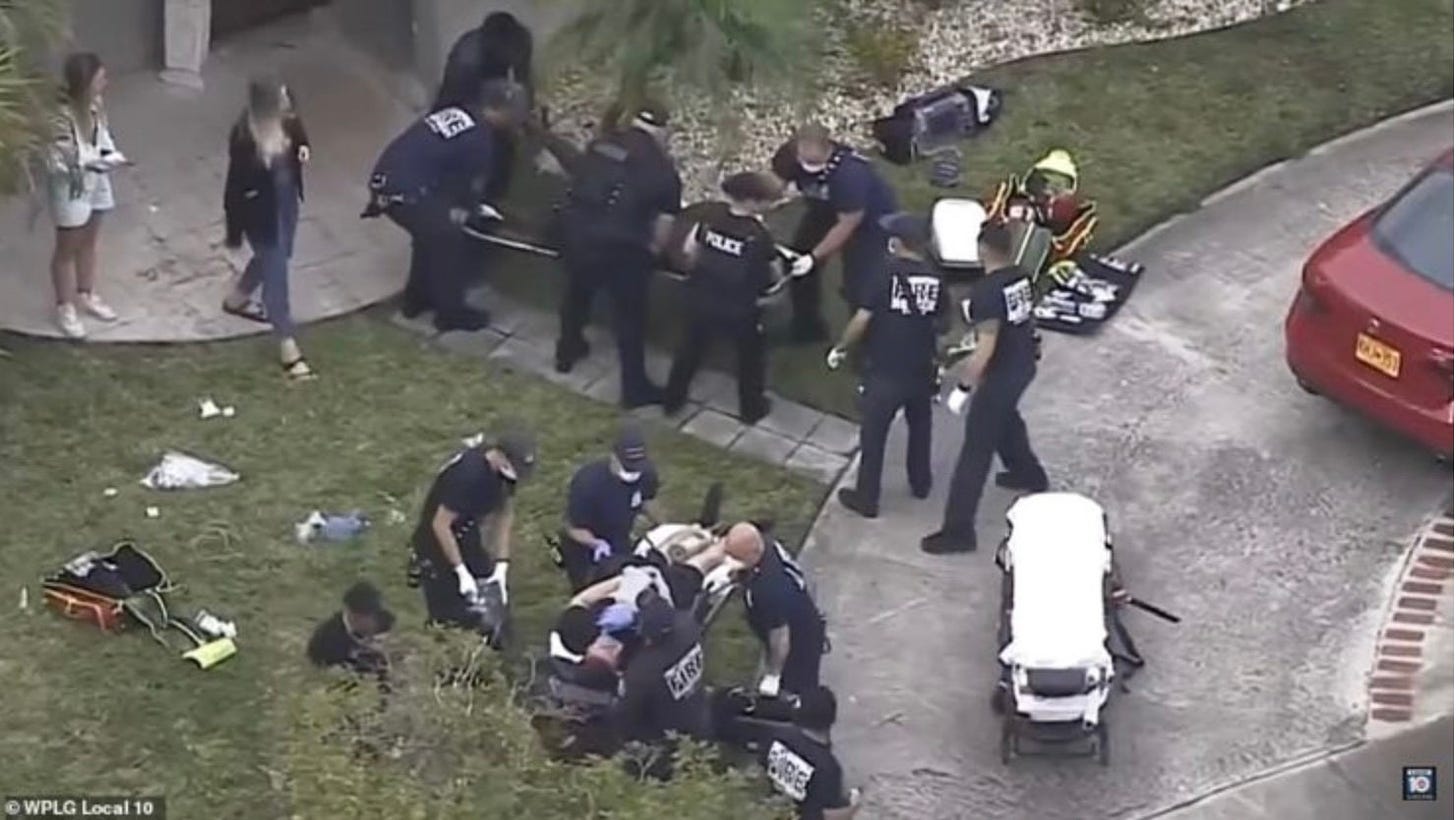You probably heard over the weekend about the five West Point cadets on spring break in Florida who overdosed on cocaine mixed with fentanyl. I certainly did. My email and private messages lit up with alerts and links to stories about it. All five, as well as a civilian, were treated with the opioid antagonist Narcan at the scene and four of the cadets were taken to the hospital. Two were described as in critical condition and were intubated. The fifth cadet was not hospitalized and may have come in contact with fentanyl through his hands while attempting to do CPR on the other victims. At the time of this writing, one cadet remains hospitalized.
Several readers of this newsletter asked me if I was going to write about the incident, and I replied that I wasn’t. What changed my mind? When I was a cadet in the late 1960’s, we lost several cadets every year to drunk driving incidents. I remember going to at least one of their funerals, a senior who was in my battalion when I was a Plebe. And then I remembered how the response of the Academy to every drunk driving death was to issue what amounted to a private memo to the 36 cadet companies reminding everyone not to drink and drive, and then the deaths were swept under the proverbial rug, seemingly the cost of doing business with a bunch of young hotheads on their way to becoming officers in the United States Army, where alcoholism was rampant, but went similarly unaddressed by senior commanders.
The drunk driving deaths were during a different era, I told one of my readers who asked me what I thought about the cadets who overdosed this past weekend. But it was all the same era, where risk-taking was, if not condoned in the army, at least tolerated among a population of overwhelmingly male soldiers who frequently treated their lives as if there was no tomorrow, because for at least some of them, there wouldn’t be. The West Point class that lost the most members in Vietnam was the class of 1966, which lost 30 out of a class of 579, most of them while I was still a cadet. Other West Point classes, including my own, suffered combat losses going back to the Civil War.
Dying in a war can at least be said to come with the territory. West Point, after all, sits up there on the Hudson River with the express purpose of preparing young men, and since 1976, women, to lead soldiers in combat. In the oath you take when you first enter West Point, and again when you graduate as a Second Lieutenant, you swear to defend the nation against all enemies, foreign and domestic, and everyone in my class certainly knew by the time we graduated that meant some of us would die living up to that oath.
But cadets who died while driving drunk didn’t have to die, and neither did the soldiers who killed themselves the same way in the army. There was a good number of them who died driving drunk every year when I was growing up as an army brat. Drunk driving of course wasn’t the thing it has become since then. People who were stopped for drunk driving in civilian towns and army posts alike were often given a citation that was treated like a speeding ticket and sent on their way. It truly was a different era in that respect.
There was what you would now call a culture of drinking in the army – in all the services, for that matter. It was expected of you. There was happy hour on Friday night at the officer’s club on every post I ever lived on, where beers and drinks were half price. When I was a kid, my parents often went out for drinks or dinner or entertained other officers and their wives two or three nights a week. I’ve written here before about being 14 and babysitting four or five nights a week for an army family when the major was nearing the end of his year at the Command and General Staff College at Fort Leavenworth. They came home drunk every single night. Those people partied, yes, like there was no tomorrow.
In my own family, I began bartending for my parents’ parties at age 12. When I was even younger, it was considered cute when I and other kids I knew drained the dregs of adults’ drinks when they were through. I can still remember the exotic taste of bitters and orange peel and sugar and whiskey when I would finish off one of my mother’s or father’s Old Fashioned cocktails.
Drinking socially was as much a part of being an army officer as exercising to stay in shape and reveille runs in the morning when you were a commander. There were battalion and brigade dining-in’s, where the whole unit of officers and their wives and girlfriends gathered for dinners in Dress Blue uniforms and formal wear, and there was a tradition of raising toasts to the president, to the unit, to the army, to the ladies – they went on and on, everyone throwing back gulp after gulp. It was all good fun and part of what we were assured was an old and honorable army tradition. That it involved copious quantities of alcohol was a big part of it but went unmentioned. It just was.
I don’t remember it, but I’m certain I drove drunk after Friday happy hours at the officer’s club and after battalion dining-in’s, and I know there was alcohol abuse at every level of rank in the army because as a platoon leader, I dealt with it every week. I remember taking one guy over to the hospital who had gotten so drunk he couldn’t stop throwing up and was having trouble breathing. They dried him out and sent him back to the platoon.
By the time I became a platoon leader, heroin addiction among soldiers returning from Vietnam was such a problem in the army that I encountered it all the time. When I would take a guy to be treated for an alcohol overdose, they would detox him and if necessary keep him in the hospital for a time and then return him to duty. But one time when I took a guy from my platoon who was addicted to heroin to the hospital to be treated for his addiction, they arrested him and threw him in the stockade the minute the word “heroin” came out of his mouth. Everybody knew soldiers were smoking pot and everyone knew there was a heroin problem among soldiers returning from Vietnam, but drugs in the army were a taboo subject and would remain so for years.
So I wasn’t surprised when I read of the cadets who overdosed this past weekend. Abusing one substance or another has no doubt been a part of army life since Caesar’s and Alexander’s time, alcohol being the acceptable drug of choice with all the others swept under this rug or that rug as they came into popular use. It was just a matter of time until cadets would accidentally overdose from fentanyl with that substance running amok in the culture, if you will, and now that it has happened, both West Point and the army will have to deal with it.
I’m sure we’ll hear at some point in the near future that the Pentagon has started a program or a study of one kind or another to look into the whole fentanyl problem and what level of danger it presents to the military as a national security issue, because we can’t have our cadets and our soldiers going into cardiac arrest before they’ve had a chance to make it to the battlefield and defend the nation. But I rather doubt they will publicly address what’s in the bottles in every barracks and every military home and consumed daily, often as part of a military ritual or celebration or ceremony.
In the military, drinking alcohol has been associated with incidents of sexual harassment and abuse over the years. The alcohol that was once just a part of the army’s culture is now a big part of the continuing problem West Point and the army have had with sexual abuse and rape both at the academy and in the army, and I know this because women graduates have told me about it. Women at West Point and in the army and other uniformed services have complained that their allegations of rape and abuse aren’t taken seriously when it’s alleged that they were drunk at the time of the incident, a problem at civilian college campuses and in the population at large.
Alcohol was just a part of army life when I was growing up. It took me a lifetime to recover from that upbringing and a way of life I carried into my own adulthood and lived with for decades. It seemed normal but it wasn't. I barely survived living like there was no tomorrow. Now that I know there is one, I want to be there for it.





Old friend, You know I lived it with you. You presented more elegantly than I ever could, and I salute you. So sad, so true. Your prediction of the Army’s response is accurate. Bless you and thank you for all you have done and still do as the for the consummate professional you have always been.🪖👍
Alcohol, as we all know, is a depressant, a bliss-killer. It's not surprising that such a substance would be popular in a Judeo-Christian nation where bliss is seen as something to be avoided and especially in the military where bliss would be downright out of place. When I was in the Army at Ft. Bragg 1969,70,71 (XVIII Abn Corps) the resident division, the 82d Airborne was called "The Jumping Junkies". There was more heroin sold on Fort Bragg than in New York City at the time. Today's hard drugs don't allow a second chance.